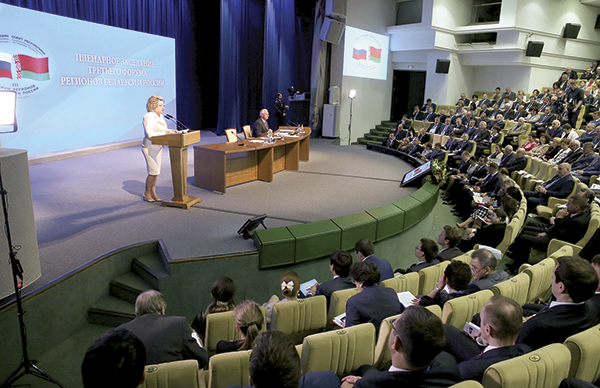The first forum day impressed even its organisers, with huge attention from the media, and a great turnout. Participants were busy across nine sections, representing most avenues of cooperation. The Council of the Republic, hosting talks by chairs of the Belarusian and Russian Upper Chambers of Parliament, received most attention. Mikhail Myasnikovich and Valentina Matvienko stressed that regional co-operation is increasingly evident and showing good results.

“The forum enjoys a major commercial component, with at least $300mln of export-import contracts expected to be signed,” the Chairman of the Council of the Republic, Mikhail Myasnikovich, comments. “This indicates that we have more potential to be explored.” The Chair of the Council of the Federation, Valentina Matvienko, agrees, saying, “Our coordinated actions, in term of industrial and agricultural development and joint investment projects, continue. Despite existing problems, actual volumes of mutual trade between our countries have preserved.”
Integration is important to Belarus from the point of view of strengthening its open economy and providing sales markets. Preservation of Russia as a global geopolitical partner depends on successful interrelations. At the same time, Belarus and Russia are building economic relations with third countries, without harming each other. On the contrary: they wish to benefit from their bilateral cooperation.
Experts say that our two states’ level of motivation is evident in such phrases as ‘import substitution’, ‘investments’, ‘new technologies’, ‘social orientation’ and ‘law unification’, which have been heard much at the forum. In particular, speakers of the Upper Chambers have agreed to continue working on rapprochement of legislation in the field of labour relations, education and healthcare. We desire to lift restrictions to mutual trade, although Ms. Matvienko believes that reporting of the problem may be exaggerated. She notes, “In touring Russian regions, I commonly see shops with ‘Products from Belarus’ posters. Your food enjoys great demand in Russia, alongside light industry manufactures.”
Mr. Myasnikovich has remarked, “Of course, it’s not easy for our economies at present; external factors don’t help and these can be softened only by uniting efforts. We need to be less affected by protectionist decisions and build a true single economic space, without restrictions or exemptions.”
Participants of the 3rd Forum of Regions of Belarus and Russia left Minsk pleased, having concluded contracts and agreements worth dozens of millions of Dollars. A plenary session followed meetings between heads of Belarusian and Russian regions with Prime Minister Andrey Kobyakov, and speakers of the Council of the Republic and the Council of the Federation, Mikhail Myasnikovich and Valentina Matvienko. The plenary was dedicated to the Union State’s coordinated social-economic policy, focusing not only upon successes but upon unsettled issues. Among key problems hampering the promotion of interregional cooperation, Mr. Myasnikovich named the falling number of established joint ventures.

He stressed, “A fall of even 6 percent is accompanied by lost jobs and lost state revenue. The establishment of joint companies — including with the participation of residents from third countries — is a priority for our cooperation. China and India could become major partners in this area.” Another proposal from Belarus dealt with the dedollarisation of mutual settlements. The time has come for our governments and state companies to shift to using national currencies in export-import operations.
Ms. Matvienko also spoke of financial problems, underlining, “The Union State’s budget is not being fully utilised. We’d love to see more interesting initiatives and promising projects from governors. We also need to introduce a common visa for the Union State; this is especially important to encourage tourist flow.”
Overall, the forum’s results met expectations. Belarusian constructors are to build a metro line in Chelyabinsk and, this year, Sakhalin Region will be buying our apples. By late 2016, the region will have imported around 250 buses and communal machinery from Belarus, and the list of agreements goes on...
Forum participants share views
Leonid Zayats, Minister for Agriculture and Food:
Agricultural produce worth around $45bln is currently being imported into the common market of the Eurasian Economic Union. Our task is to replace imported products.
Svetlana Orlova, the Head of the Vladimir Region’s Administration:
I view joint projects in the field of energy as promising. Peat reserves are estimated at 9 million tonnes, and you boast experience of using this fuel.
Zhanna Birich, the Deputy Chair of Minsk City Executive Committee:
During the forum, Minsk and Moscow signed a plan for 2016-2018: a roadmap for our cooperation across the spheres of industry, transport, housing-and-community, trade, culture, healthcare, education, family and youth policy, social protection and sport.
Victor Zimin, the Head of the Republic of Khakassia:
On behalf of all people of Khakassia — who suffered from fires a year ago — I wish to thank Belarusians for their help. We’ve received several train carriages of furniture from Belarus, in addition to white goods and other products. Our strength lies in this unity and mutual help.
Vadimir Gusakov, the Chairman of the National Academy of Sciences’ Presidium:
If we unite Russian and Belarusian scientific potential, much could be achieved. We need to jointly work on artificial intelligence innovations, which is a rapidly developing global focus.
Vadim Potomsky, the Head of Orel Region’s Administration:
Our plans have been surpassed in most avenues. Orel Region is eager to purchase feed and grain harvesting machinery from Belarus. A project under the GLONASS system is also being realised for Belarusian machinery.
Lilia Ananich, Belarus’ Information Minister:
You sometimes see speculation online regarding contradictions between our two states’ people. I think we should counteract this sort of information jointly, clearly articulating the true governmental position, which reflects the genuine state of affairs.
By Vladimir Khromov











